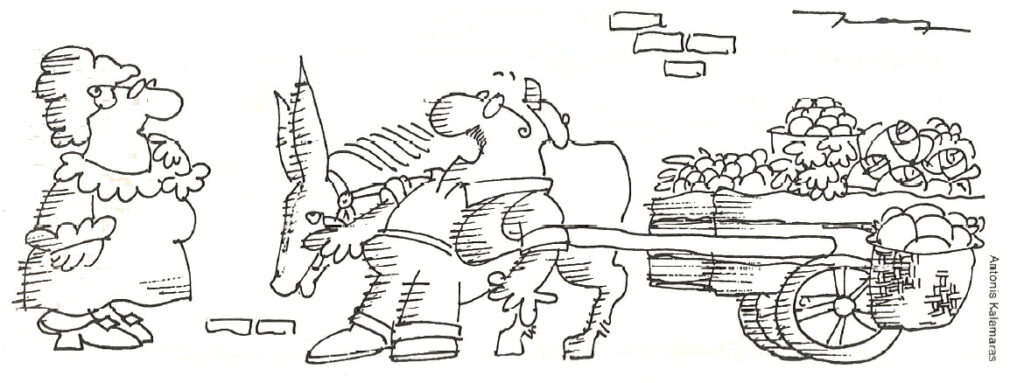
He was on his way to the Renault agency on the 8th kilometer of the national road to Lamia, hoping against hope that the vital spare part had come in and that this would be the last of the sixteen trips he had made to the agency since his car had finally packed up after twenty-one years of faithful service.
At the bus stop, there was a crowd of about thirty people, all anxiously looking up the road, hoping to see a sign of one of the few, ramshackle old Hungarian vehicles that served urban and inter-urban transport in Athens. He discovered that some of the people there had been waiting for four hours, and that since six o’cl.ock in the morning, only one bus had gone by, and that one chock-a-block full of passengers.
So he decided to walk, thinking how simple it would have been to ring up the agency, except that the phones had stopped working, save for government business and emergencies through a switchboard, after the cheap equipment OTE had bought from Eastern Europe had totally collapsed in 1997 and never been replaced.

As he walked at a steady pace along Leoforos Kifissias, he was passed at rare intervals by old codgers like himself, driving decrepit old Ford Fiestas and even older Volkswagon beetles that, in most cases, were held together with baling wire and pieces of string. His mind went back to the good old days when the price of a new car had not been much more than that of a three-room apartment in Kolonaki, and the subsequent taxation . that had brought it up to the equivalent of the car’s weight in gold. The government had finally succeeded, around 1985, in making it impossible for a Greek to buy a new car and, over the years, as spare parts for the older models ceased being produced by the manufacturers and as the skill and improvisation of Greek mechanics reached the farthest limits of ingenuity, car owners reluctantly had to relegate their vehicles to the junk heap and rely on mass transport, such as it was, or their legs, as he was doing.
The young, of course, had refused to put up with such an intolerable situation and, in the late eighties, when it became possible for Greeks to work in the Common Market countries, there had been a mass exodus of able-bodied Greek men ·and women between the ages of twenty and forty who found jobs in the, by then, booming industries of Western Europe.
The ones who stayed behind were those who had been fortunate enough to be appointed to the multiplying government agencies, set up to check and control the operations of the socialised industries, and those who had been appointed to various administrative and clerical positions in the industries themselves.
Of the older population, those who did not live off the remittances from their kinfolk in Western Europe, worked in the hotels and restaurants that catered to the growing number of tourists who were visiting Greece every year. One beneficial effect of the reduced number of cars and extremely low output of the socialised industries in the Attica basin, had been to clear the air of noxious fumes and make Athens as livable and attractive as it had been in the early fifties.
On the other hand, there was the problem of transporting these tourists to other parts of the country once they had visited Athens and were eager to savor the delights of the Greek countryside and the islands.
Government attempts to replace Olympic Airways’ ageing fleet of Boeing 737’s on a barter basis, in exchange for a bumper crop of peaches in 1998 had failed, after the first trainload of peaches had been kept in a railway siding at Katerini for two weeks during which a team of quality control inspectors from the Ministry of Commerce had checked every crate. The peaches were found to be in tip-top condition but by the time they arrived at their Eastern European destination they were crawling out of the crates by themselves. The deal fell through and the Boeings had been grounded until another barter deal could be negotiated.
The railways had stopped working after having been modernised and electrified at enormous expense, when the Public Power Corporation had to divert the greater part of its kilowatt-hour output to a new aluminum smelter set up with Iraqui assistance and had no power left over for the railways.
The coastal passenger ships, which had been socialised, had been manned by such large crew complements, and the few remaining beds were so filled with civil servants taking their annual three-month holiday, that there was no room on them at all for tourists.
Travel agents had to make do by transporting their clients in the few, thirty-year-old coaches that were still able to reach Delphi with only three breakdowns en route and by hiring the Kifissia horse-drawn carriages for a two-day excursion to Sounion.
As he mused on these things, the old man realised he had reached Ekali, and he sat for a breather on a low wall opposite the Prime Minister’s villa.
There was a coster-monger’s cart outside with a stately-looking old lady selecting a cabbage from among the wares.
“How much for this one?” she asked.
The coster-monger weighed it on his portable scales and said: “For you, only three thousand drachmas.”
“Tsk, tsk,” the lady said with a frown. “Only last week I bought one for two thousand eight hundred.”
“What can we do, Kyria Margarita?,” the coster-monger replied, spreading his hands out wide. “Two days ago your husband, may he have a long life, raised the donkey-power tax by fifty per cent. Everything is going up these days.”







